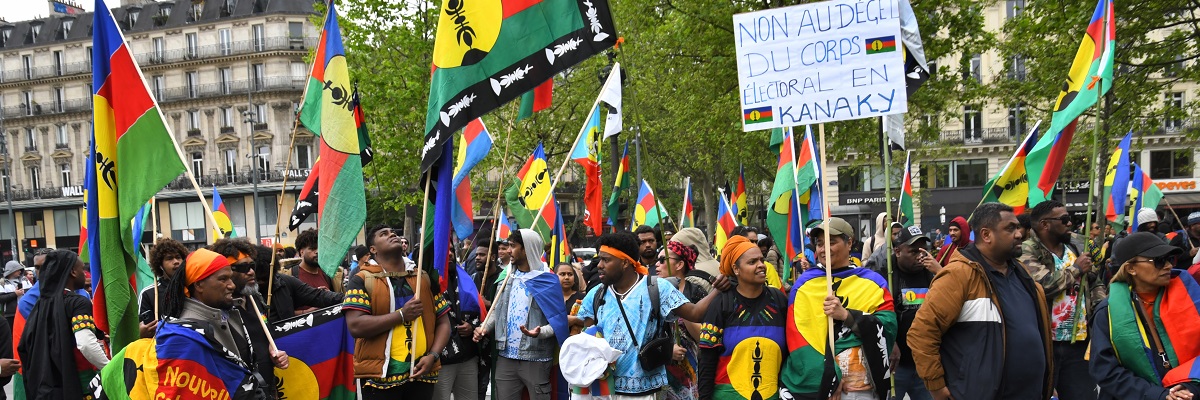Defense & Security
The nickel behind Macron's recolonization project in New Caledonia

Image Source : Shutterstock
Subscribe to our weekly newsletters for free
If you want to subscribe to World & New World Newsletter, please enter
your e-mail
Defense & Security

Image Source : Shutterstock
First Published in: May.17,2024
Jul.15, 2024
The riots in New Caledonia have led the Government of the French Republic to intensify repression on the Pacific Island. This week, High Commissioner Louis Le Franc has announced that the police presence would be increased, nearly doubling from 1,700 to 2,700 officers. Officially, five people, including two police officers, have died in the clashes, which have arisen due to a legal change in the system of electing representatives that discriminates against the indigenous Kanak population, who make up 40% of the total population. The clashes are also a result of the deep inequality between the Kanak people and the settlers, who are organized into militias, and are said to have carried out executions of civilians. Kanak organizations claim that the death toll among civilians could be higher. Since Wednesday, May 15th, an emergency state has been declared in the archipelago, and the army has been deployed around ports and airports. More than two hundred people have been detained. The situation has worsened due to problems accessing food — due to distribution issues, according to the island government — and healthcare services, which have arisen since the unrest began in early May. The government has stated that in several neighborhoods, "control is no longer assured," and they hope to dismantle the barricades with explosives placed by the masses of protesters. It is estimated that there are around 9,000 protesters, of whom 5,000 are in Nouméa, the capital, especially in the neighborhoods of Kaméré, Montravel, and Vallée-du-Tir. Additionally, the metropolis has banned access to TikTok — a network used for information among the protesters — and the Ministry of Justice has announced "harsher penalties against rioters and looters." The Ground Action Coordination Cell (CCAT) is the main organization of the Kanak population and has linked the protests to the "methodical sabotage of the decolonization process by the French state" from the very beginning. The fact is that since 1986, New Caledonia has been part of the territories to be decolonized according to the United Nations. "Since Emmanuel Macron came to power, France has radically sabotaged the decolonization process," stated the anticolonial organization Survie in a statement. The government's response has been to discredit the CCAT as a "mafia-like" organization and to denounce foreign interference from Azerbaijan, a country which, according to the Élysée Palace, would be seeking revenge for France's support of its Armenian rivals in the Nagorno-Karabakh conflict.
The protests arose in response to a reform by the French government aimed at expanding the electorate for provincial elections in New Caledonia, a territory with an estimated population of 300,000 people. The plan involves extending the right to vote to the recently settled colonial population, around 25,000 people, which would further exclude 40% of the island's indigenous population from the representative system, who are the most affected by poverty and exclusion. The settlers are already able to vote in French presidential and municipal elections, but the plan would change the balance in provincial elections. Thus, supporters of independence and the Kanak population interpret that the "Nouméa Accord" of 1988, which grants more guarantees to the Kanak population, would be reversed in order to further privilege the settlers who have gradually been settling in the territory, attracted by tax benefits and the relationship between their high salaries with European standards and the low prices in the archipelago. This is yet another nail in a hardline shift directed by Macron's government, which in 2021 imposed a referendum to shore up French colonial power over the archipelago despite demands for postponement from the Kanaks and significant voices in French society, who called for respect for the Kanak mourning for those who died from COVID-19. As expected, abstention determined the results. The current constitutional bill to "unfreeze" the electorate, which has been voted on in the Senate and must be endorsed by the French Assembly, has sparked multiple protests, including strikes at the port and airport of Nouméa, closure of numerous administrations, the beginning of a riot at the Nouméa prison, and clashes between police and youth from working-class neighborhoods of Nouméa. As noted in an article from the environmentalist newspaper Reporterre, the control of New Caledonia is strategic for France. The island hosts between 20 and 30% of the world's nickel resources, a resource used in the manufacturing of batteries for electric cars. One out of every four people works in the nickel sector, despite which the industry is in crisis, leading the metropolis, under the guidance of Bruno Le Maire, Minister of Economy, to present a "nickel pact" that would introduce millions in aid to the sector but, at the same time, reverse a 1998 agreement by which the island secured management of the nickel. The proposed pact, explained by an expert cited by Reporterre, "completely departs from the model of mining revenues that benefit New Caledonia for its own development" and follows point by point with a neocolonial logic. Additionally, the metropolis aims for the archipelago to export more raw material, which would lead New Caledonia to lose the added benefit of in-situ nickel processing.
First published in :

Contributor to El Salto
Unlock articles by signing up or logging in.
Become a member for unrestricted reading!